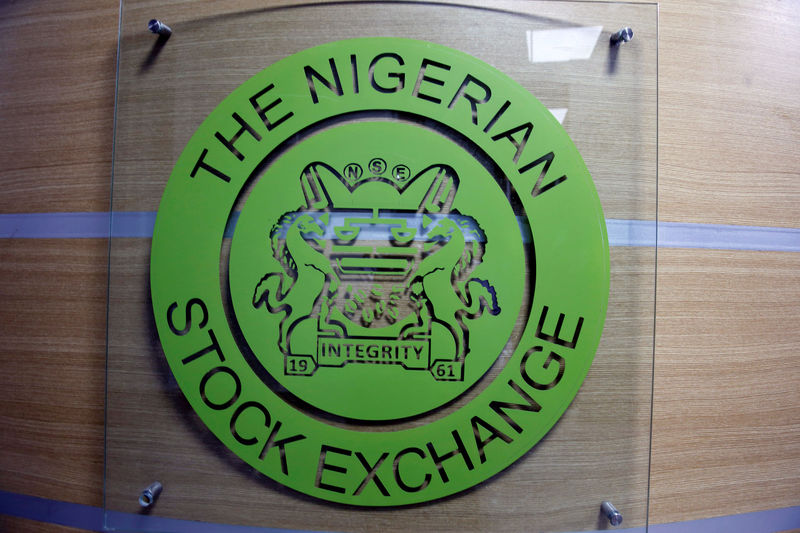By Chijioke Ohuocha
ABUJA, Feb 11 (Reuters) - Nigeria has approved a three-year
plan to trim offshore borrowing to 30% of its total loans from
40% currently, in a bid to strengthen domestic markets, the Debt
Management office (DMO) said on Thursday.
The government has laid out plans to borrow more at home
with local interest rates at historic lows amid low revenues
accruing from an oil price slump and as the coronavirus pandemic
has disrupted markets.
At a cabinet meeting on Wednesday, the government approved
that 70% of its total borrowings should come from local sources
by 2023, the DMO said.
In 2016, Nigeria had planned for 40% of its loans to come
from offshore sources by 2019, compared with 16% then, to lower
costs. The DMO said foreign loans were 33% of loans by 2019.
"A larger proportion of new borrowing will be from domestic
sources ... while for external borrowing ... multilateral and
bilateral sources will be prioritised," the DMO said its
2020-2023 debt management strategy document.
Nigerian government debt has been rising in recent years, as
well as its debt service burden, limiting the country's ability
to invest in infrastructure and social services. With the
COVID-19 disruption to revenue, debt is projected to rise
further.
The DMO said it raised Nigeria's target debt-to-GDP ratio to
40% from 25% to accommodate new loans and to repay short-term
central bank borrowings. It added that the new ratio was below
IMF's 55% threshold for Nigeria's peers.
Nigeria is facing its second recession in five years,
brought on by an oil price crash, which has hammered its
currency, created large financing needs and caused chronic
dollar shortages, frustrating businesses and individuals.
In January, the government repaid a $500 million eurobond
with the proceeds of a local bond issue and said it was
monitoring the international debt market for new issues by
frontier countries.
- English (USA)
- English (UK)
- English (India)
- English (Canada)
- English (Australia)
- English (South Africa)
- English (Philippines)
- Deutsch
- Español (España)
- Español (México)
- Français
- Italiano
- Nederlands
- Português (Portugal)
- Polski
- Português (Brasil)
- Русский
- Türkçe
- العربية
- Ελληνικά
- Svenska
- Suomi
- עברית
- 日本語
- 한국어
- 简体中文
- 繁體中文
- Bahasa Indonesia
- Bahasa Melayu
- ไทย
- Tiếng Việt
- हिंदी
Nigeria to cut offshore borrowings in new debt strategy
Published 11/02/2021, 13:37
Updated 11/02/2021, 13:42
Nigeria to cut offshore borrowings in new debt strategy

Latest comments
Install Our App
Risk Disclosure: Trading in financial instruments and/or cryptocurrencies involves high risks including the risk of losing some, or all, of your investment amount, and may not be suitable for all investors. Prices of cryptocurrencies are extremely volatile and may be affected by external factors such as financial, regulatory or political events. Trading on margin increases the financial risks.
Before deciding to trade in financial instrument or cryptocurrencies you should be fully informed of the risks and costs associated with trading the financial markets, carefully consider your investment objectives, level of experience, and risk appetite, and seek professional advice where needed.
Fusion Media would like to remind you that the data contained in this website is not necessarily real-time nor accurate. The data and prices on the website are not necessarily provided by any market or exchange, but may be provided by market makers, and so prices may not be accurate and may differ from the actual price at any given market, meaning prices are indicative and not appropriate for trading purposes. Fusion Media and any provider of the data contained in this website will not accept liability for any loss or damage as a result of your trading, or your reliance on the information contained within this website.
It is prohibited to use, store, reproduce, display, modify, transmit or distribute the data contained in this website without the explicit prior written permission of Fusion Media and/or the data provider. All intellectual property rights are reserved by the providers and/or the exchange providing the data contained in this website.
Fusion Media may be compensated by the advertisers that appear on the website, based on your interaction with the advertisements or advertisers
Before deciding to trade in financial instrument or cryptocurrencies you should be fully informed of the risks and costs associated with trading the financial markets, carefully consider your investment objectives, level of experience, and risk appetite, and seek professional advice where needed.
Fusion Media would like to remind you that the data contained in this website is not necessarily real-time nor accurate. The data and prices on the website are not necessarily provided by any market or exchange, but may be provided by market makers, and so prices may not be accurate and may differ from the actual price at any given market, meaning prices are indicative and not appropriate for trading purposes. Fusion Media and any provider of the data contained in this website will not accept liability for any loss or damage as a result of your trading, or your reliance on the information contained within this website.
It is prohibited to use, store, reproduce, display, modify, transmit or distribute the data contained in this website without the explicit prior written permission of Fusion Media and/or the data provider. All intellectual property rights are reserved by the providers and/or the exchange providing the data contained in this website.
Fusion Media may be compensated by the advertisers that appear on the website, based on your interaction with the advertisements or advertisers
© 2007-2024 - Fusion Media Limited. All Rights Reserved.